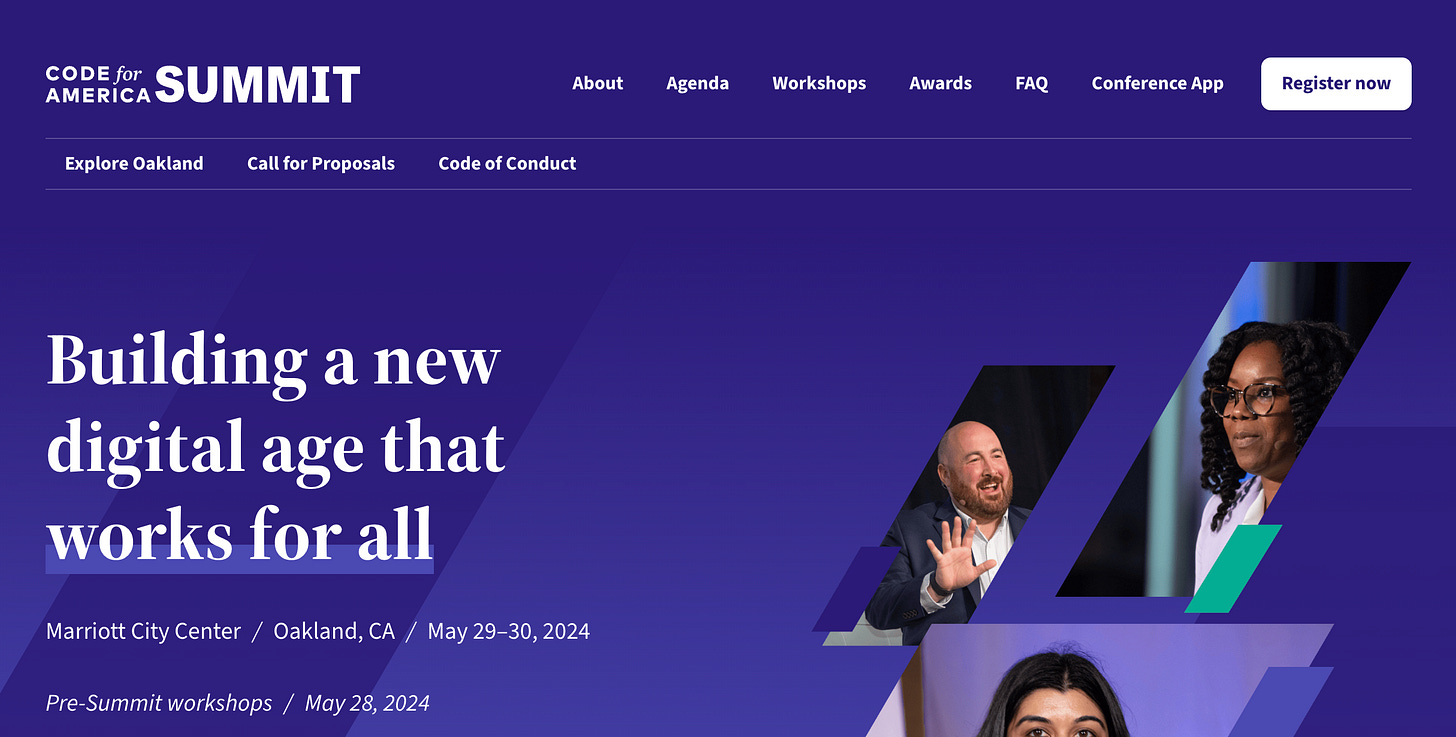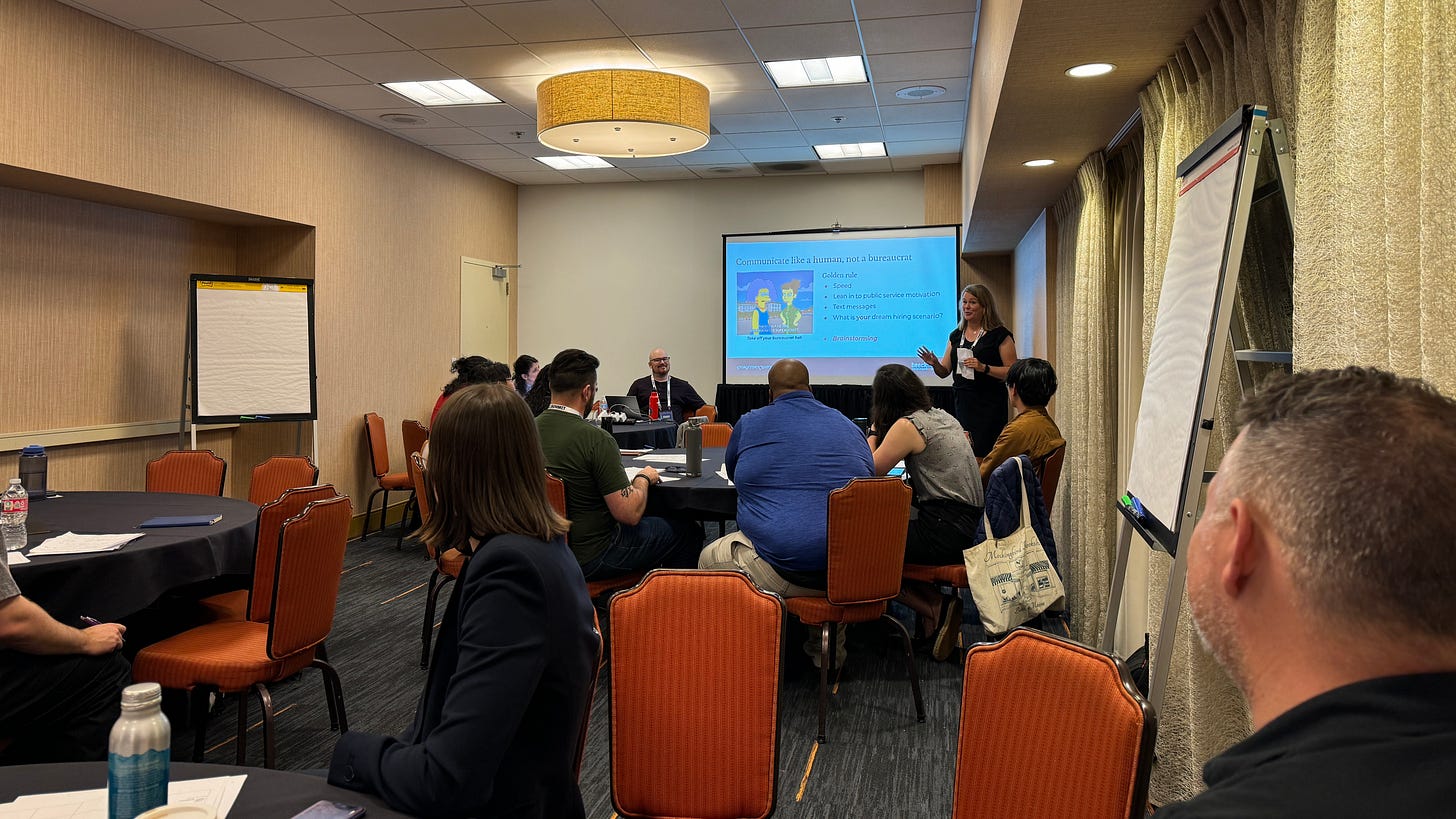Code for America Summit 2024 : Day 1
Impressions from #CfASummit in Oakland - May 28, 2024
A portion of our GX Foundry team made it out to Code for America’s annual Summit this week, and we’re attending all 3 days. As noted in the prior post, 4 of us made the trip, arriving on Memorial Day, to ensure we didn’t have any travel complications and to give us time to adjust to the 3-hour time shift.

Day 1 was a partial day with focused workshops, and we attended 3 of the 4 available sessions. Our quick impressions of the sessions are below.
#CfASummit : The Power of Multilingual Public Service Delivery
Kristen attended this workshop, and was excited to explore this complex topic, which intersects with her work on digital document signatures and surveys. Her takeaways:
We had some really great discussions about the importance of engaging in multilingual research. Language, culture, and experience all impact how a person interacts with a service, and we have to ensure we understand the needs of all the communities we serve. Through connecting with and learning from those community members, and through creating feedback loops, we can broaden the accessibility and trust in our government services.
#CfASummit : Procurement for the People: Approaches for More Inclusive Services
Sarah attended this workshop, despite not being a procurement expert. However in her first year of government work, she’s already come into contact with some of our procurement challenges and wanted to learn more. Her takeaways:
I attended this workshop because procurement was the topic I knew the least about. I love getting to learn about something from smart people who care about a topic and think deeply about its failures and possibilities. And that is exactly who attended that session!
One thing I’m going to be thinking about more is how to build in human centered metrics into things like contracts that seem to be so stripped of the lived experience through legalese. Alameda County’s probation office, for example—when writing contracts for vendors who provide direct services like housing to the public—includes stipulations about treating residents with basic human dignity. So many of the problems we try to automate, legislate, and contract to solve are deeply human and it’s important to keep that at the forefront of our work.
#CfASummit : Closing Government’s Technology Talent Gap
Both Eric and John took part in this workshop. They’ve done a lot of hiring work for our organization and were looking to find ways to improve our work further. Their takeaways:
Eric
I was given a lot of food for thought about what inspires candidates considering technology roles within government.
The assumption is that an engineer is looking for a high salary, all of the latest and greatest tech, and the ability to work remotely full time. While some of these may be true, potential candidates can also be influenced by how they can have an impact on our community, whether that’s at the local, state, or federal level.
We can help “sell” these positions through telling our story, having clarity in what working for government is really like, being speedy in the interview and decision processes, and supporting not only the person who gets the position, but also all of the candidates by staying in regular contact with them throughout the process.
John
From listening to the presentations and the discussion, I discovered we're doing a fairly good job at explaining our roles in terms that make sense to candidates, but we don't do as well with integrating our new hires with their roles in the first 6 months—that is, our onboarding is not robust enough and needs some tweaks that extend beyond the first week or two.
I also realized I am too analytical in my approach to talking about jobs when promoting them to candidates and instead need to get personal and share stories of impact on a human scale. That is, we need to be telling very direct, visceral stories about how our digital work turns into real-world impacts for real people. This kind of storytelling dovetails with what I'm trying to do in other areas of our organization, so it makes sense to me, but it didn't occur to me to do it in recruiting. That was a real #smh moment for me. Why didn’t I figure this out sooner?
We’ll be back with more from the #CfASummit thoughts over the next couple days.
Check out our notes and comments from the other 2 days of the Summit:






Great epiphany, @johnproffitt. CX is all about getting personal and sharing stories of impact on a human scale. Numbers mattet, stories bring the impact to life.
Yeah, I have to fight my analytical tendencies!